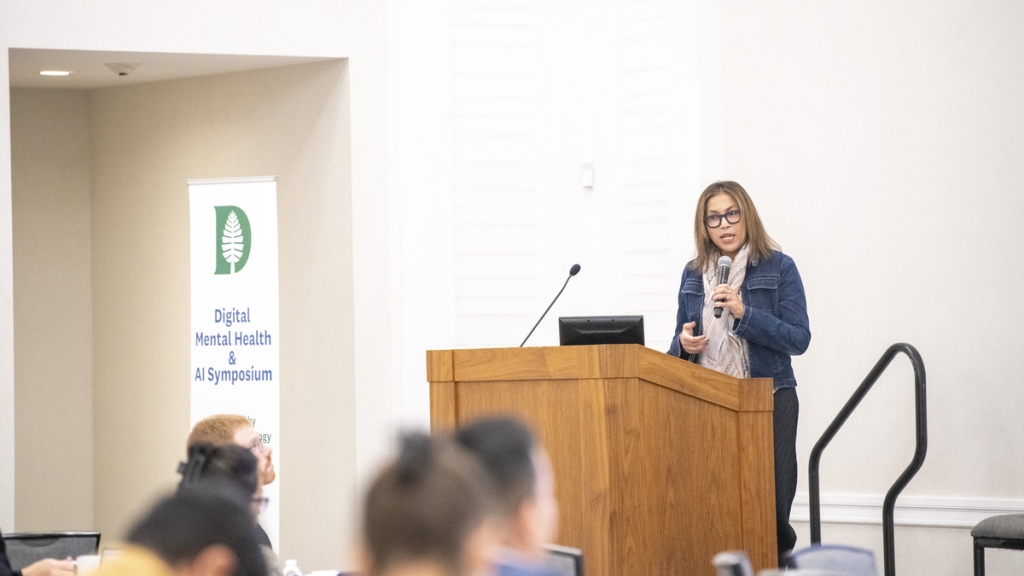Technology offers new avenues for mental health delivery. Digital record keeping, virtual consultations, wearables that monitor activity and well-being, mindfulness apps, and AI-based chatbots are just a few examples.
But these advances have not been leveraged effectively enough, Cornell Tech Professor and HealthRhythms Co-Founder Tanzeem Choudhury said in a keynote talk Tuesday at the Digital Mental Health and AI Symposium organized by the Center for Technology and Behavioral Health.
Choudhury explored the challenges that have forestalled digital mental health from delivering on some of its early promises and how to move the needle forward.
Mental health tools draw data from a dizzying array of devices and sources, develop solutions for multiple stakeholders—patients, providers, and payers, and must be reliable across individuals and over time. This is a tall order, Choudhury said, and centering clinical utilization and integration when developing applications is key.
Building users' trust in the technology is also vital, she said, noting, "Adoption moves at the speed of trust."
In opening remarks to kick off the event at the Hanover Inn, President Sian Leah Beilock said that the importance of health and well-being cannot be overstated, especially on college campuses.

Dartmouth President Sian Leah Beilock, a cognitive scientist, also spoke at the event. (Photo By Kata Sasvari)
President Beilock emphasized the importance of bringing together people who work across research areas and technologies to inspire breakthroughs that can power paradigm shifts in mental health care.
"We, as an institution, are really committed to making well-being a primary area of focus both in terms of what we prioritize on our campus and in terms of the research we give away to the world," she said.
The one-day event brought together leading experts to discuss how new technologies are changing the landscape of mental health care and reflect on the challenges of converting promising research into real-world applications that are beneficial, ethical, and equitable.
The day's first panel discussion, Navigating New Frontiers: Generative AI and Passive Sensing in Mental Health, looked at how the latest technologies allow researchers to reimagine their approach to mental health.
Passive sensing refers to the use of everyday devices such as smartphones to gather data within the context of people's daily lives to track their wellbeing. The integration of AI in mental health care is a gamechanger, promising speedy, effective, and potentially personalized treatments, as well as better accessibility and affordability of services.
"We're at the dawn of the renaissance of mental health right now. And simultaneously in one of the riskiest, most dangerous times in history," said Bill Hudenko, assistant professor in the Department of Psychological and Brain Sciences and CEO, Everpage.
Companies are building impressive tools that aim to enable machines to "understand" people, guide clinicians on what to say to have better impact, and prescribe appropriate therapeutics. And yet, regulation and informed conversations about biases, ethics, and other concerns are important to keep bad actors at bay, he cautioned.
"Keeping humans in the loop is important," said assistant professor of computer science, Soroush Vosoughi. Combining machine learning from data, which tend to be black boxes whose inner workings are not apparent, with expert-designed AI algorithms that are interpretable can exploit the best of both worlds, he said.
He further stressed the need to keep technology research and development separate from application. Just like there is a process to translate clinical research to application through trials, deployment of digital applications can be regulated, he said.
Sarah Preum, assistant professor of computer science, brought attention to the lack of equity in access to resources needed to build apps based on large language models.
While AI in this context typically brings to mind chatbots designed to counsel patients, its value as a summarization tool that can quickly extract key insights from vast amounts of data must not be forgotten, said Deepak Ganesan, professor of computer science at UMass Amherst. "Generative AI can be the bridge that can present data in ways that make sense to different stakeholders," he said.
In the final session of the morning, David Mohr, director of the Center for Behavioral Intervention Technologies at the Feinberg School of Medicine, Northwestern, spoke about what it takes to achieve effective real-world implementations in health care systems.
"I have a background in psychology, but I love technology and learning about ways it can be applied to problems in my field," said Tinashe Tapera, a graduate student at Northeastern University studying personal health. Typically surrounded by tech folks that are quick to ask, "how do we build an app for that?" Tapera was heartened that the speakers didn't shy away from laying bare the challenges inherent in bringing technology to health care.
The Digital Mental Health & AI Symposium was sponsored by Center for Technology and Behavioral Health and in cooperation with the HealthX Lab and AIM HIGH Lab.
